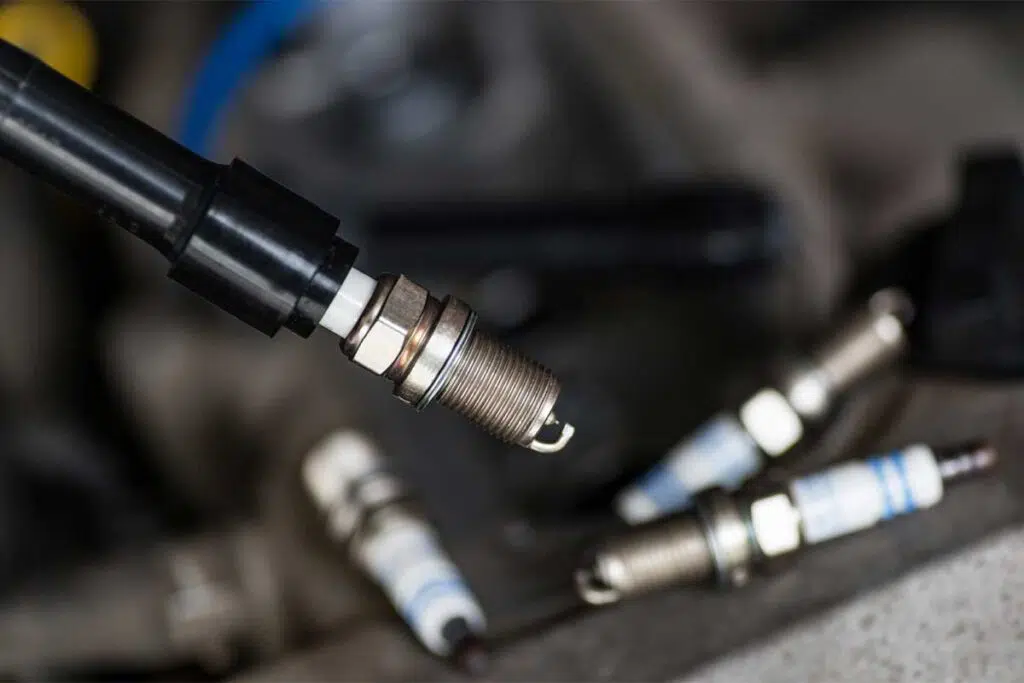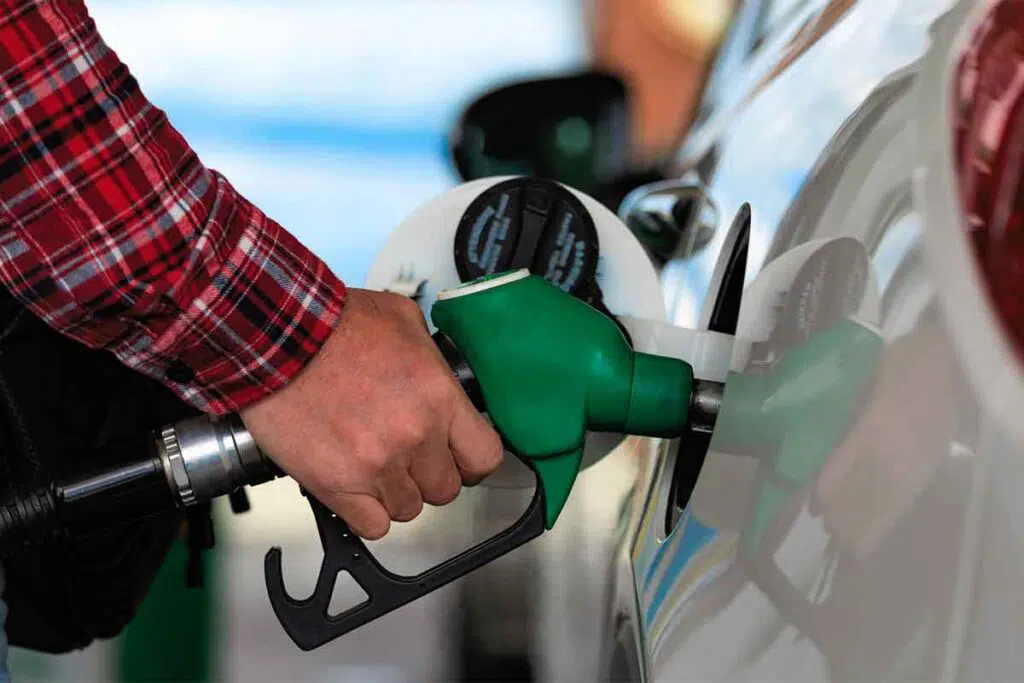A gasoline odor inside your car can be quite concerning. While some potential causes could be from gasoline droplets on your hands or clothing, others involve more crucial vehicle components. These culprits, when undetected, can lead to more intricate problems or expensive repairs. So you may be wondering, “Why does my car smell like gas?”
Among the most common causes of a gas smell in cars are loose fuel caps, broken charcoal canisters, and gas leaks. Other reasons often stem from a lack of proper vehicle care and maintenance. In some instances, however, the age of the vehicle is to blame.
Here are 11 possible reasons why your car smells like gas:
- Loose or damaged gas cap
- Broken fuel canister
- Gas leak
- Oil leak
- Leaky tailpipe
- Faulty pressure regulator
- Unsecured spark plugs
- Poor window and door seals
- Vintage cars
- Spills
- Gas exposure
Learn more about these probable causes and how to address them as we go over each in greater detail. We will also cover estimated repair costs and some of the most frequently asked questions relating to gasoline odors.
Many reasons for a gas smell in a car have to do with its engine and fuel system. However, faulty components and damaged engine parts are not wholly responsible for that nasty smell. Let’s cover the top 11 reasons why your car smells like gas.
Why Does My Car Smell Like Gas?

1. Loose or Damaged Gas Cap
A common reason behind the gas smell in your car is a damaged, loose, or missing gas cap. Car owners often neglect to check on it and rarely think of an unsecured fuel tank cap as the probable cause. Nevertheless, a loose gas cap should never be ignored, as it can release gas fumes.
A loose gas cap usually triggers the check engine light. In case it does not, do a manual inspection. Twist the cap clockwise to see if it is tight or not. If it does not fully tighten, chances are the O-ring is missing, broken, or flattened, or the cap itself is damaged. Either way, replacing the gas cap is needed.
2. Broken Fuel Canister
A fuel canister (a.k.a. canister purge valve or charcoal canister) is an essential part of your vehicle’s Evaporative Emission Control System (EVAP). EVAP seals your car’s fuel system, preventing harmful fuel vapors from getting released into the environment. The fuel canister, in particular, catches charcoal and collects excess fuel vapor coming out of the tank. Since the canister is made of plastic, it is prone to breakage over time. When this happens, the trapped fuel vapors are then released inside the cabin of your car, giving off that gas-like smell.
Aside from the smell of gas in your car, an activated check engine light, a pinging sound, or decreased engine performance usually accompanies a broken canister issue. Unfortunately, a fuel canister cannot be repaired once it is damaged and will need to be replaced.
3. Gas Leak
Three common areas where gas leaks occur are fuel lines, engines, or exhaust systems. Luckily, distinguishing the problem can be done right away because your car will only smell like gas when you start or idle the vehicle. Beginner drivers may find it confusing to tell oil leaks and gas leaks apart. If you happen to be one, there is a trick to help you out – a gas leak will always have a more pungent smell than an oil leak.
In addition to the above components, check the fuel tank, injector, and injection lines when ruling out a gas leak. Depending on the age and frequency of vehicle use, these components may be run-down or in poor condition (especially the rubber seals and gaskets). Whatever your findings, the most important thing to do is to address gas leaks immediately, as gas fumes are not only hazardous to the driver and passengers (due to their mercaptan content) but can also potentially cause a fire.
4. Oil Leak
If you ever wonder, “Why do I smell gas in my car?” despite a fully tightened gas cap, then you may be experiencing an oil leak unknowingly. When leaking oil hits a hot surface, it burns and produces a gas-like smell. This particular reason may seem a bit far-fetched but, in truth, is one of the first set of things to suspect if you get that gas smell in your car after driving.
To rule out whether leaking oil is behind the unpleasant smell inside your vehicle:
- Check for leaks under the hood and underneath the car.
- Remember to include valve cover gaskets in your inspection, too, as this section of your vehicle produces the most heat and is equally prone to leakage.
- Watch out for wet, dark oily spots on any of the engine components or the floor of your garage, as these indicators usually point to an oil leak.
5. Leaky Tailpipe
Since an automobile’s HVAC and EVAP systems are intertwined, exhaust fumes can cause your car to smell like gas inside. Your car burns gas as it accelerates, producing exhaust fumes in the process. Sometimes, exhaust fumes circle back into your car’s ventilation system instead of exit through the exhaust. At other times, a drippy exhaust pipe causes the gas-like fumes to linger inside your vehicle’s cabin.
Similar to a broken fuel canister, a leaking exhaust pipe is determined by tapping or ticking noises that grow louder the more your vehicle accelerates. It is also easy to diagnose – all you have to do is put a towel over the tailpipe as the car idles. If everything works as it should, the towel should build up with pressure. Otherwise, you have yourself an exhaust pipe problem – and an upcoming schedule with your local mechanic.
6. Faulty Pressure Regulator
When fuel pressure goes awry due to a bad pressure regulator, it can cause the engine to run too rich or lean or the catalytic converter to overheat. Either outcome means burning more fuel and translates into more gas fumes inside the exhaust. And based on the symptoms associated with a leaky exhaust pipe, we already know what will happen next. Apart from failing fuel pressure regulators, other tell-tale signs of bad fuel pressure include a noticeable decrease in fuel efficiency and power output.
7. Unsecured Spark Plugs

If you’re wondering, “Why does my car smell like gas when I start it,” check the spark plugs. They may seem an unlikely culprit, but spark plugs tend to loosen after long periods of driving. When this happens – more specifically, when washers go missing or become cracked – spark plugs end up not being seated correctly, which causes your cabin to smell like gas.
The fix for this issue is simply replacing the spark plug with a new one. However, take note not to interchange the order of the washers that need replacement, if any. Otherwise, your car will not start – even with a new spark plug.
8. Poor Window and Door Seals
Both old and new vehicles are not exempt from having poor-quality door and window seals. The quality of car seals continues to be overlooked as the reason for gas-like fumes to permeate inside the cabin. The good news is that replacing stretched-out seals is all it takes to keep gas-like smells outside your vehicle’s interior. The bad news is that a complete replacement of your car’s weatherstripping can cost between $130 and $800 – unless you can do it yourself.
9. Vintage Cars
Automobiles manufactured in the early ’80s are more likely to release a faint gasoline odor after being driven. This tendency is due to the absence of an EVAP system inside the vehicle, meaning that fuel continues to boil in the carb’s float bowl even after the engine has been shut off.
10. Spills
Gas spills (either on the exterior of your car or on your hands and clothes) are bound to happen. One drop of gas dripping from the fuel pump and missing the tank can emit a powerful smell that can linger in your car for the rest of the day (or longer).
How to Get Gas Smell Out of Car From Spills
Wipe the spill with a dry, absorbent cloth. Or, if the gas spill is on your clothes, change your outfit and wash your hands.
A home remedy to neutralize the odor is to mix baking soda with white vinegar and hot water. In most cases, applying this mixture to the spilled area on your car eliminates the gas-like smell.
11. Gas Exposure

The vehicle’s HVAC system draws outside air into the vents, filters it, then transforms it into cool air inside the car. When you are at a gas station, the air entering your vehicle will naturally smell of gas fumes – hence, the gas smell in your car.
In this scenario, getting the gas smell out of the car is easy. You only need to drive around for a few minutes with your windows rolled down. This procedure should get rid of the gas-like smell inside your wheeler. Otherwise, you may need to look into other probable causes already stated above.
Is It Safe to Drive a Car that Smells Like Gas?
It largely depends on the specific reason causing the gas-like smell in your vehicle. But if I were to side with caution, my immediate response would be “No.” Even if it were not the case, gasoline odors are often associated with gas leaks. And where there is leaking gas, there is the danger of your vehicle catching fire. Address any suspected leak in your car’s fuel system at the first sign of its symptoms, and avoid driving until you have eliminated the problem source.
What Do You Do if You Smell Gas in Your Car?
On top of the solutions already covered in the list above, you can determine the source of a potential fuel leak by using UV or fluorescent dye – especially if the leak proves challenging to pinpoint. You can add this fluid to your gas tank before you run your engine. Doing this will make it easier for you to spot where the fuel leak in your car is.
Smelling the exhaust after running your vehicle is likewise an effective way to identify what is causing the gasoline odor lingering inside your wheeler. A strong gas-like smell coming from the exhaust would indicate a potential problem with your air-fuel systems and a much-needed car tune-up.
Cost to Fix a Gas Leak in a Car
Since a potential gas leak is not the only reason behind that persistent gasoline odor inside your vehicle, here are approximate repair (or replacement) costs for all probable causes:
| Causes of Gas Smell Inside Vehicles (figures below do not include labor costs) | Estimated Repair Cost |
|---|---|
| Loose or damaged gas cap | $15 – $60 |
| Broken fuel canister | $150 – $560 |
| Gas leak (Fuel lines, gas tank, engine, exhaust system) | $60 – $1,160 |
| Oil leak (Valve cover gaskets) | $150 – $1,200 |
| Leaky tailpipe | $150 – $850 |
| Faulty pressure regulator | $100 – $500 |
| Unsecured spark plugs | $50 – $100 |
| Poor window and door seals | $130 – $800 |
Note that the above costs are estimates and don’t include labor fees, which may be from $50 – $400. You will need to factor that in to whichever is particularly causing the gas-like smell inside your vehicle.
Conclusion – Why Does My Car Smell Like Gas?
In summary, here are 11 possible reasons why your car smells like gas:
- Loose or damaged gas cap
- Broken fuel canister
- Gas leak
- Oil leak
- Leaky tailpipe
- Faulty pressure regulator
- Unsecured spark plugs
- Poor window and door seals
- Vintage cars
- Spills
- Gas exposure
Note that the above reasons and their corresponding fixes do not encompass all existing causes for gas-like smells in cars. There are other less common but equally troublesome sources of this same problem that other vehicle owners currently experience. In any of these situations, have your service manual ready. Furthermore, seek assistance from a professional mechanic.
Kris is an avid off-roader and outdoor enthusiast who loves to brave the elements and take on challenging terrain. He also enjoys sharing his passion and knowledge with others so that they, too, can appreciate the ride.
About Kris
